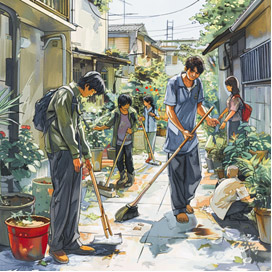若き学生時代に急遽海外放浪の旅に踏み出し、その経験から外国人賃貸業界に深い興味を抱くようになったのが、イチイ社長・荻野氏です。このコラムでは、そんな荻野の体験をコラム形式でお届けします。
※本コラムは『異文化共生住宅』をテーマにイチイ社長 荻野が2005年1月から2006年3月まで週刊住宅に寄稿したものです。
近所で評判の掃除大好き外国人 掃除は自分でする国しない国
「隣近所の掃除までする」という評判の、外国人の話を聞いた。毎朝、その外国人の若者達は箒と塵取りを手に、自分達の家だけでなく隣近所やその街区の路地まで掃除をする。彼らは「何者?」と言うと、昼は専門学校、夜は生活費を稼ぐため居酒屋でアルバイトをするパキスタン出身の留学生だ。
そんな彼らが日本に来て最初に直面した問題は、“アパート探し”であった。日本人の保証人が見つけられなく、アパートが借りられなかったのだ。事情を知った彼らのアルバイト先のオーナーである鈴木さんは、「よーし、それでは・・・」と会社名義で1軒家を借り、社宅として彼らに貸す事にした。
大決心をした鈴木さんだが、彼らの引越しの日が近づくにつれ「掃除はきちんとやるだろうか?」「ガスの扱いはどうだろう」「近所とのトラブルは・・・」など、心配や不安がどんどんよぎって来た。そこで彼は学生達に3つの事を守らせることにした。それは”早起き”すること、近所の人に会ったら“挨拶”をすること、そして自分達の家の前だけでなく隣り近所や路地を毎日“掃除”することだ。この3つは鈴木さんが店の運営上守っていることで、店も地域も人と上手くやるコツは同じだろうと考えてのことだ。
だが、依然不安はあった。彼らの中に、日本に来るまで自分で掃除をしたことがなく、掃除は他人(メイドなど)にやってもらうものだと思っている者がいたからだ。パキスタンに限らずインド、エジプトなどでは、特に上流階級とか大金持ちでもなく、ごく普通の共稼ぎ夫婦や独身の勤め人でもメイドを雇い掃除を依頼する。なにしろインドには10億の人口があり、安い労働力を容易に確保できるという背景がある。これは一種のワークシェアリングなのであろう。
そのためか、部屋探しに来るインド人から「部屋の定期掃除はあるのですか?」とか、「部屋の掃除は頼めるのですか?」などの質問がよくある。
さて、パキスタン人の彼らだが、その後も店主の“これが日本のしきたり3カ条”を忠実に守っているため、近所とのコミュニケーションはすこぶる良好らしい。

Intercultural Coexistence Housing in the Borderless Era
33rd Edition: How to Deal with Cultural Differences
The Foreign Cleanliness Enthusiasts Famous in the Neighborhood
Countries Where People Do or Don’t Clean for Themselves
I heard a story about foreigners who are known for cleaning not just their homes but also the neighborhood. Every morning, these young foreigners take brooms and dustpans in hand and clean not only their own house but also the alleys of the neighborhood. Who are they? They are Pakistani students studying at a vocational school during the day and working part-time at an izakaya (a Japanese pub) at night to cover their living expenses.
The first problem they faced when they came to Japan was finding an apartment. They couldn’t rent an apartment because they couldn’t find a Japanese guarantor. Knowing their situation, their employer, Mr. Suzuki, decided to rent a house under the company’s name and let them use it as a company dormitory.
Although Mr. Suzuki made this big decision, as the moving day approached, he began to worry: “Will they clean properly?” “How will they handle the gas?” “Will there be any trouble with the neighbors?” So, he decided to have them follow three rules: wake up early, greet neighbors when they see them, and clean not just in front of their own house but also the neighboring areas and alleys every day. These are the rules Mr. Suzuki follows for running his business, thinking that the same principles of getting along with people would apply.
However, there were still concerns. Some of them had never cleaned for themselves before coming to Japan and thought that cleaning was something done by others (like maids). This is not unique to Pakistan; in countries like India and Egypt, even ordinary working couples or single employees often hire maids to clean. In India, with a population of 1 billion, cheap labor is easily available. This can be seen as a form of work-sharing.
Due to this background, Indian people looking for rooms often ask, “Is there regular cleaning service for the room?” or “Can I hire someone to clean the room?”
As for the Pakistani students, they have been faithfully following the “Three Rules of Japanese Custom” given by the shop owner, and their communication with the neighborhood seems to be excellent.
无国界时代的异文化共生住宅
第33回:如何应对文化差异
邻里间声誉极佳的外国清洁爱好者
国家的不同,决定了是否自己打扫
听说过一个关于“打扫邻里”的外国人的故事。每天早上,这些外国年轻人手拿扫帚和簸箕,不仅打扫自己的房屋,还清理邻里的街道和小巷。他们是谁呢?他们是来自巴基斯坦的留学生,白天在专门学校学习,晚上在居酒屋兼职以赚取生活费。
他们来日本后面临的第一个问题是找房子。他们找不到日本担保人,无法租房子。了解情况后,他们的雇主铃木先生决定以公司的名义租下一栋房子,并将其作为公司的宿舍租给他们。
尽管铃木先生下定了这个重大决心,但随着搬家日的临近,他开始担心:“他们会好好打扫吗?”“他们会正确使用燃气吗?”“会不会与邻居发生纠纷?”因此,他决定让他们遵守三件事:早起,遇到邻居时打招呼,以及每天打扫不仅自己家的前面,还包括邻居的区域和小巷。这三件事是铃木先生在经营店铺时所遵守的,他认为经营店铺和与人相处的诀窍是一样的。
然而,依然存在一些担忧。他们中有些人在来日本之前从未自己打扫过,认为打扫是别人的事(如女仆)。不仅在巴基斯坦,在印度、埃及等国家,即使不是上层阶级或富人,普通的双职工夫妇或单身职员也会雇佣女仆打扫。毕竟,印度有10亿人口,容易获得廉价劳动力。这可以看作是一种工作共享。
因此,前来找房的印度人经常问:“房间有定期清洁服务吗?”或“可以雇人来打扫房间吗?”
至于这些巴基斯坦学生,由于他们忠实地遵守店主给出的“日本习俗三条”,与邻居的沟通非常顺畅。
荻野社長ブログはコチラ▶ https://co-lifestyle.net

